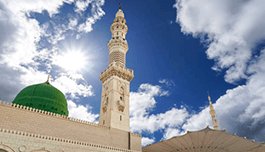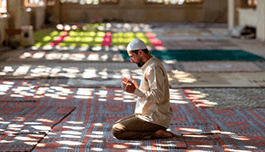In this article, you will discover four simple acts of worship that enable you to construct not one but FOUR houses in Jannah (Paradise) every day.
The houses of Jannah are are not any ordinary houses; they are magnificent dwellings specially designed by Allah Himself for the inhabitants of Paradise. Allah has described them as “…beautiful mansions in Gardens of everlasting bliss” (Qur’an, 9:72) and “… they will reside in the high dwellings [or chambers] in peace and security.” (Qur’an, 34:37).
Ibn Katheer said: “Allah has told us about His blessed slaves who will have dwelings in Paradise: these will be lofty palaces; high rooms, one above another – story upon story, well-constructed, strong and decorated.”
These four daily actions that build dwellings in Paradise are:
- Praying 12 Rakat Sunnah Mu’akkadah
- Reciting Surah Al-Ikhlaas ten times
- Praying between 4 Rakat and 12 Rakat of Salat Al-Duha
- Offering four voluntary Rakat before the ‘Asr prayer
1. Praying 12 Rakat Sunnah Mu’akkadah
It is highly recommended to pray 12 Rakaat of supererogatory prayers every day alongisde the Fardh (obligatory) prayers, known as ‘Sunnah Mu’akkadah’ or ‘Al-Sunnan Ar-Rawatib’. A house will be build in Jannah for whoever performs these twelve rakat each day.
1. Aishah narrated that Allah’s Messenger (ﷺ) said: “Whoever is regular with twelve Rak’ah of Sunnah (prayer), Allah will build a house for him in Paradise: Four Rak’ah before Dhuhr, two Rak’ah after it, two Rak’ah after Maghrib, two Rak’ah after Isha, and two Rak’ah before Fajr.” (Narrated by Al-Tirmidhi (414), in the chapter “What Has Been Related About One Who Prays Twelve Rak’ah Of Sunnah In A Day and Night, And What Virtues He Will Have For That”, Al-Nasa’i (1794) and Ibn Majah (1140). Authenticated by Al-Albani and Ahmad Shakir in Sunan Al-Tirmidhi).
2. Umm Habibah narrated that Allah’s Messenger (ﷺ) said: “Whoever prays twelve voluntary units of prayer in a day, a house will be built for him in Paradise.” (Narrated by Muslim (728) in the chapter “The virtue of the regular sunnah prayers before and after the obligatory prayers, and their numbers”, Abu Dawood (1250), Al-Tirmidhi (415), Al-Nasa’i (1808), Ibn Majah (1141) and Ahmad (26769)).
Umm Habibah added: “I have never abandoned (observing them) since I heard it from the Messenger of Allah (ﷺ).” Imam Muslim after narrated this report said: “Some of the other narrators said the same words: “I have never abandoned (observing them) since I heard (from so and so).””
3. Abu Musa Al-Ash’ari narrated that the Prophet (ﷺ) said: “Whoever prays in the day and night twelve Rakat besides the obligatory prayers, a house will be built for him in Paradise.” (Narrated by Ahmad (19709), Al-Bazzar (3197) and Al-Tabarani (9436). Classed as Sahih lighairihi (authentic because of corroborating reports) by Shuaib Al Arna’ut).
ِ4. Abu Hurairah reported that the Prophet (ﷺ) said: There is no Muslim slave who prays twelve rak’ahs voluntarily in a day except that a house will be built for him in Paradise. (Narrated by Ahmad (10462), al-Tayalisi (2530) and Ibn Abi Shaybah (2/204) with a hasan (good) isnad).
2. Reciting Surah Al-Ikhlaas 10 times
1. Mu’adh ibn Anas al-Juhani reported that the Prophet (ﷺ) who said: “Whoever recites ‘Say, He is Allah, [Who is] One’ until he completes it ten times, Allah will build for him a palace in Paradise.” Umar ibn al-Khattab said: “Then we will increase our recitation, O Messenger of Allah?” The Messenger of Allah (peace be upon him) replied: “Allah has more and better.” (Narrated by Ahmad (15610), al-Tabarani (397) and Ibn al-Sunni in “Amal al-Yawm wa al-Layla” (698)).
2. Abu Huraira reported that the Messenger of Allah (ﷺ) said: “Whoever recites {Say, He is Allah, [Who is] One} ten times, a palace will be built for him in Paradise. Whoever recites it twenty times, two palaces will be built for him. Whoever recites it thirty times, three palaces will be built for him.” (Narrated by Al-Tabarani in Al-Mu’jam Al-Awsat (1/93). Al-Haythami said in Majma’ Al-Zawa’id (7/148): “It includes Hani’ ibn Al-Mutawakkil, and he is weak.”).
3. Sa’eed ibn al-Musayyab reported that the Prophet (ﷺ) said: “Whoever recites “Say, He is Allah, [Who is] One” ten times, Allah will build for him a palace in Paradise. Whoever recites it twenty times, Allah will build for him two palaces in Paradise. Whoever recites it thirty times, Allah will build for him three palaces in Paradise. Umar ibn al-Khattab, may Allah be pleased with him, said: “Then our palaces will be many!” The Messenger of Allah, peace and blessings be upon him, replied: “Allah is more generous than that.” (Narrated by Al-Darimi said in his Sunan (2/459)).
Ibn Kathir said: “This is a good Mursal hadith.”
Husain Asad, in his commentary on Al-Darimi after mentioning its chains, said: “Perhaps these chains along with the Mursal narrations strengthen each other, thus making the hadith Hasan (good).”
Similarly, it was classed as Hasan by Al-Albani in Al-Sahihah (2/136, 589) and Sahih Al-Jami’ (6472) due to collaborating reports.
3. Praying between 4 Rakat and 12 Rakat of Salat Al-Duha
1. Abu Musa Al-Ash’ari Narrated that the Prophet (ﷺ) said: “”Whoever prays four units of Duha and four units before the first prayer (i.e. Dhuhr), a house will be built for him in Paradise.” (Narrated by Al-Tabarani “Al-Mu’jam Al-Awsat” (4753). It was classed as Hasan (good) by As-Suyuti in “Al-Jami Al-Sagheer” (8781) and Al-Albani in “Sahih al-Jami” (6340)).
Al-Munawi said in Fayd al-Qadir: “It appears that what is meant by his saying ‘before the first’ is the Dhur prayer, as it was the first obligatory prayer established on the night of Isra, and it is the first of the obligatory prayers performed during the Duha time.”
This means that one should pray 4 Rakat of Duha at its time, then pray the regular 4 Rakat Sunnah of Dhuhr, to get the reward.
The following are the two hadith that encourage praying 12 Rakat of Duha:
1. Anas ibn Malik narrated that the Messenger of Allah (ﷺ) said: “Whoever prays twelve units of Duha prayer, Allah will build for him a palace in Paradise made of gold.” (Narrated by Al-Tirmidhi (473) and Ibn Majah (1380). Ibn Hajar al-Asqalani said in Al-Talkhees Al-Habeer (2/508): “Its chain of transmission is weak.”).
2. Abu Darda narrated that the Messenger of Allah (ﷺ) said: “Whoever prays two units of Duha will not be written amongst the heedless, and whoever prays four will be written amongst the worshipers, and whoever prays six, it will suffice him on that day, and whoever prays 8 will be written amongst the pious, and whoever prays 12 rakʿahs, Allah will build for him a palace in Paradise.”
(Narrated by At-Tabarani (2326). Al-Mundhiri said in “Al-Targhib wal-Tarhib” (1/320): ” Its narrators are trustworthy, but there is a difference of opinion about Musa ibn Ya’qub al-Zam’i. It has been narrated by a group of companions, and this is the best chain of narration I know of.” Al-Dimyati said something similar in Al-Mutajir al-Rabih (79)).
4. Offering 4 voluntary Rakat before the ‘Asr prayer
1. Umm Habiba reported that the Messenger of Allah (ﷺ) said:
“Whoever preserves four units of prayer before the afternoon (Asr) prayer, Allah Almighty builds a house for him in Paradise.”
(Narrated by Abu Ya’la (7137). Al-Busiri said in “Ithaf al-Khayyirah al-Muhrah” (2316): “The narration was reported by Abu Ya’la, and in its chain is Muhammad ibn Sa’id Al-Mu’adhdhin. Al-Hafidh Al-Mundhiri said, ‘It is not known who he is.’ I say, Al-Bayhaqi declared him reliable, and the remaining narrators in the chain are trustworthy.” Hussein Asad Al-Darani said in his checking of the Musnad: “Its chain of transmission is good”)).
Conclusion
By incorporating these four practices into our daily lives—praying 12 Rakat Sunnah, reciting Surah Al-Ikhlaas 10 times, performing Salat Al-Duha, and praying four voluntary Rakat before ‘Asr—we can build at least 4 houses or palaces every day for ourselves in Jannah.
The pious predecessors who knew about this spent their days in these acts of worship, building thousands of palaces for themselves to enjoy for eternity.
Let us strive to make these practices a consistent part of our worship, seeking Allah’s pleasure and the eternal bliss of Paradise. May Allah grant us the strength and consistency to act upon these teachings and reward us with the best of rewards. Ameen.






